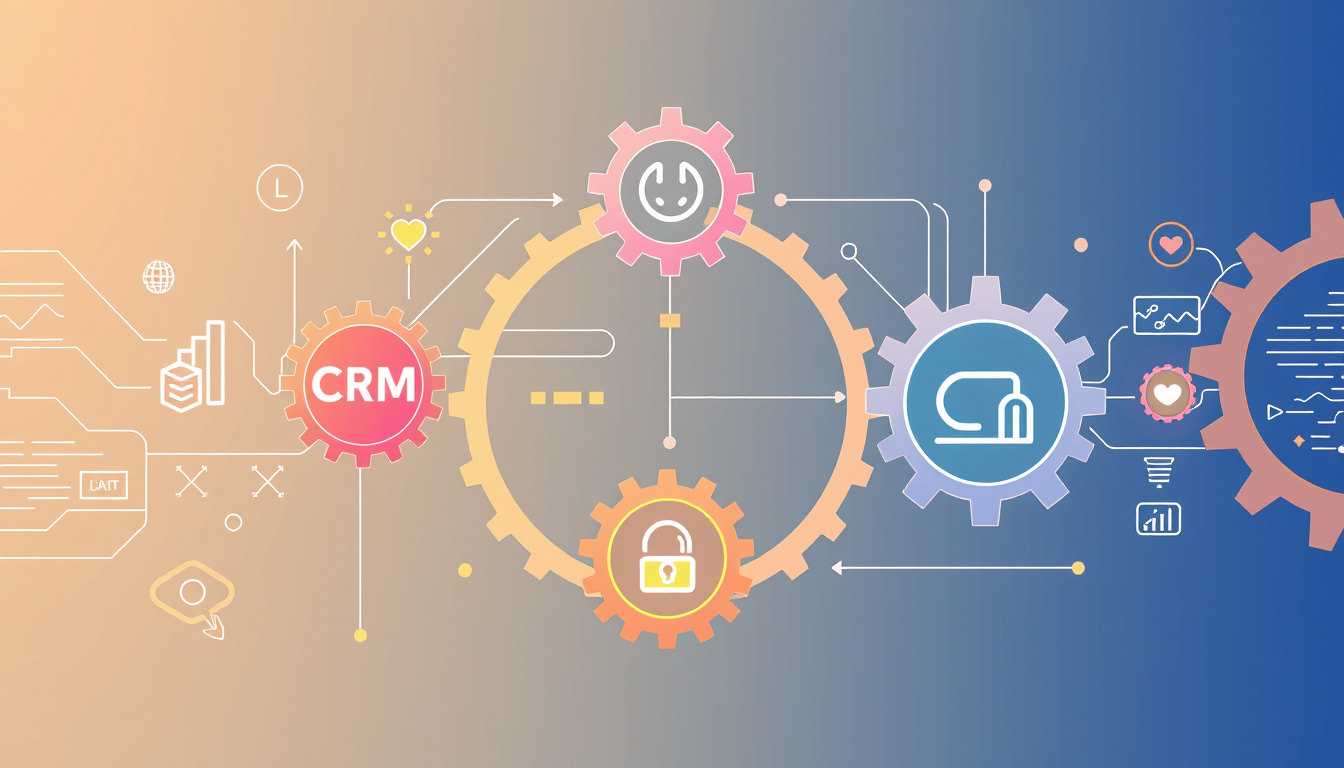🤝 Integrating CRM with Marketing Efforts That Build Loyalty

In the fast-paced digital landscape, businesses are constantly seeking innovative ways to engage with customers and enhance loyalty. One effective strategy that has gained significant traction is 🤝 integrating CRM with marketing efforts that build loyalty. By harnessing the power of Customer Relationship Management (CRM) systems, companies can create seamless connections between their marketing strategies and customer interactions. In this article, we will explore the definition of CRM, its importance in today’s marketing landscape, and how businesses can effectively merge these two powerful tools to foster deeper customer relationships and drive brand loyalty.

Key Takeaways
- CRM is essential for collecting and analyzing customer data to inform marketing strategies.
- Integrating CRM with marketing automation tools enhances personalized marketing efforts.
- Effective customer profiles allow businesses to target audiences more accurately.
- Real-time analytics are crucial for evaluating the success of marketing campaigns.
- Implementing loyalty-focused strategies fosters deeper customer relationships and retention.
1. Understanding CRM: Definition and Importance
Customer Relationship Management (CRM) is a strategic approach that businesses employ to manage interactions with existing and potential customers. Understanding CRM is essential because it allows companies to streamline processes, enhance customer relationships, and improve profitability. At its core, CRM involves the use of technology to automate and synchronize sales, marketing, customer service, and technical support. One of the critical aspects of CRM is its role in 🤝 integrating CRM with marketing efforts that build loyalty. By leveraging data insights gathered through CRM systems, businesses can personalize their marketing strategies, ensuring that they cater to the unique preferences and behaviors of their customers. This integration facilitates targeted marketing campaigns, enhances customer experience, and fosters long-term relationships that are essential for cultivating brand loyalty. In today’s competitive market landscape, understanding and effectively implementing CRM not only contributes to immediate sales growth but also lays the foundation for sustained customer loyalty.
2. The Role of CRM in Modern Marketing Strategies
In today's competitive landscape, integrating CRM with marketing efforts that build loyalty is more crucial than ever. Customer Relationship Management (CRM) systems serve as the backbone of modern marketing strategies by providing valuable insights into customer behavior, preferences, and interactions. By analyzing this data, businesses can create personalized marketing campaigns that resonate with their audience, fostering a deeper connection and trust. For instance, using CRM to track customer purchase history enables companies to send targeted promotions and recommendations, enhancing the customer experience. Furthermore, CRM tools facilitate seamless communication across various marketing channels, ensuring consistent messaging and engagement throughout the customer journey. As a result, organizations that adeptly integrate CRM into their marketing efforts not only boost customer satisfaction but also cultivate long-term loyalty, ultimately driving higher retention rates and increased revenue.
'It's not what you sell that matters as much as how you sell it.' - Dr. Philip Kotler

3. Building Customer Profiles: Gathering and Utilizing Data
In today's highly competitive marketplace, integrating CRM with marketing efforts that build loyalty is not just an option; it's a necessity. Building customer profiles through effective data gathering is crucial for tailoring your marketing strategies to meet the needs and preferences of your audience. By utilizing a robust Customer Relationship Management (CRM) system, businesses can collect valuable information about customer behaviors, preferences, and purchase history. This data enables companies to segment their customer base accurately, target specific demographics, and personalize marketing campaigns. The insights gained from these profiles help in crafting messages that resonate with customers, ultimately fostering deeper relationships and encouraging customer loyalty. Leveraging customer data not only enhances marketing effectiveness but also drives retention efforts, ensuring that your customers feel valued and engaged.
4. Seamless Integration: Connecting CRM with Marketing Automation Tools
In today's competitive marketplace, businesses are increasingly recognizing the importance of 🤝 integrating CRM with marketing efforts that build loyalty. By seamlessly connecting Customer Relationship Management (CRM) systems with marketing automation tools, companies not only streamline their operations but also enhance customer experiences. This integration allows for a unified view of customer interactions, enabling businesses to tailor their marketing strategies effectively. For instance, by analyzing customer data from the CRM, organizations can segment their audience more accurately and create personalized campaigns that resonate with their target audience. Such precision leads to higher engagement rates and fosters long-lasting loyalty, as customers feel understood and valued. Furthermore, automated workflows can trigger timely communications based on customer behavior, ensuring that marketing efforts remain relevant and impactful. As businesses continue to leverage technology to strengthen their relationships with customers, the synergy between CRM and marketing automation is proving to be a game-changer in cultivating brand loyalty.

5. Real-time Analytics: Measuring the Effectiveness of Campaigns
In today's fast-paced digital landscape, integrating CRM with marketing efforts that build loyalty is essential for businesses aiming to achieve sustainable growth. Real-time analytics plays a pivotal role in measuring the effectiveness of campaigns, allowing marketers to make informed decisions and adjust strategies on the fly. By utilizing CRM tools, companies can track customer interactions, segment audiences, and analyze data in real-time, providing insights into what engages their clients most. This data-driven approach not only enhances the effectiveness of marketing campaigns but also helps in nurturing customer relationships by tailoring communications and offers based on individual preferences. As a result, businesses can foster loyalty among their customer base while optimizing their marketing efforts for maximum impact.
6. Cultivating Customer Loyalty: Strategies for Engagement
In today's competitive marketplace, businesses are increasingly recognizing the importance of cultivating customer loyalty as a cornerstone of sustainable growth. 🤝 Integrating CRM with marketing efforts that build loyalty can significantly enhance engagement and retention strategies. By leveraging customer relationship management systems, companies can gather valuable insights into customer preferences, behaviors, and past interactions. This information allows for personalized marketing campaigns that resonate more deeply with customers. Furthermore, implementing feedback loops where customers can share their experiences fosters a sense of community and trust. Engaging customers through targeted emails, loyalty rewards, and tailored content not only strengthens the brand-consumer relationship but also encourages repeat purchases. Ultimately, by creatively and effectively integrating CRM with marketing efforts, businesses can create a loyal customer base that feels valued and understood.

7. Case Studies: Successful Integrations of CRM and Marketing Efforts
Integrating CRM with marketing efforts that build loyalty is essential for modern businesses aiming to enhance customer relationships and drive sales. Numerous successful case studies exemplify how companies have effectively merged these two critical functions. For instance, a leading retail brand utilized their CRM data to segment customers based on purchasing behavior and preferences. By employing targeted email campaigns that offered personalized discounts and product recommendations, they significantly increased repeat purchases and overall customer engagement. Similarly, a SaaS company leveraged its CRM system to track customer interactions and feedback, allowing their marketing team to tailor content and campaigns that addressed specific pain points. This not only improved customer satisfaction but also fostered a community of loyal users who felt understood and valued. These examples underscore the powerful synergy created by integrating CRM with marketing strategies, demonstrating that such efforts not only build loyalty but also promote a more profound connection between the brand and its customers.
Frequently Asked Questions
What is CRM and why is it important for marketing?
CRM stands for Customer Relationship Management. It is a strategy for managing a company’s interactions with current and potential customers. By integrating CRM with marketing efforts, businesses can enhance customer experiences, track marketing effectiveness, and ultimately drive loyalty.
How does CRM contribute to modern marketing strategies?
CRM systems help businesses gather essential data about customer interactions which aids in creating personalized marketing strategies. They facilitate targeted marketing efforts, improving customer engagement and satisfaction.
What is the process of building customer profiles using CRM data?
Building customer profiles involves gathering data like purchase history, preferences, and demographic information. This data is then analyzed and utilized to tailor marketing messages and campaigns that resonate with individual customers.
How can CRM be integrated with marketing automation tools?
Integrating CRM with marketing automation tools can be achieved through APIs or built-in connectors. This allows for seamless data sharing, enhancing the effectiveness of targeted campaigns and automating repetitive marketing tasks.
What are some effective strategies for cultivating customer loyalty through CRM?
Effective strategies include personalized communications, loyalty programs, regular engagement through emails and social media, and using customer feedback to improve products or services.
Authored by - Abdulla Basha
Email id - mail@abdullabasha.com
Linkedin